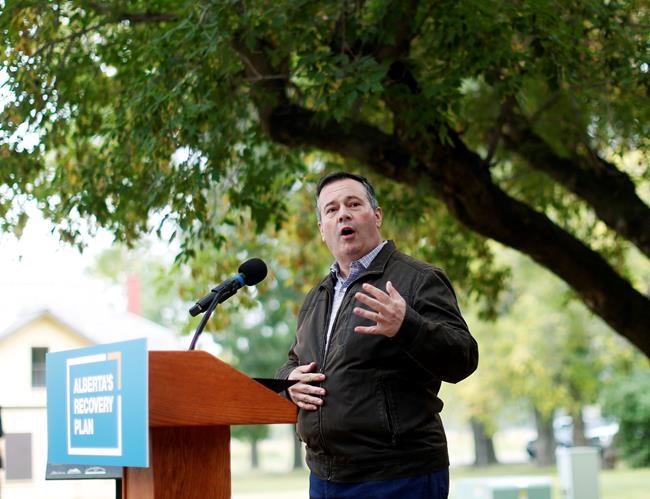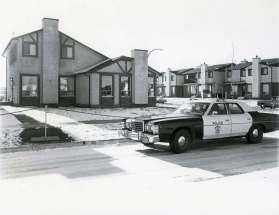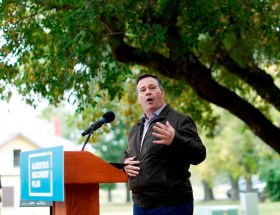Time for Alberta to embrace sales-tax reality
Read this article for free:
or
Already have an account? Log in here »
To continue reading, please subscribe:
Monthly Digital Subscription
$0 for the first 4 weeks*
- Enjoy unlimited reading on winnipegfreepress.com
- Read the E-Edition, our digital replica newspaper
- Access News Break, our award-winning app
- Play interactive puzzles
*No charge for 4 weeks then price increases to the regular rate of $19.00 plus GST every four weeks. Offer available to new and qualified returning subscribers only. Cancel any time.
Monthly Digital Subscription
$4.75/week*
- Enjoy unlimited reading on winnipegfreepress.com
- Read the E-Edition, our digital replica newspaper
- Access News Break, our award-winning app
- Play interactive puzzles
*Billed as $19 plus GST every four weeks. Cancel any time.
To continue reading, please subscribe:
Add Free Press access to your Brandon Sun subscription for only an additional
$1 for the first 4 weeks*
*Your next subscription payment will increase by $1.00 and you will be charged $16.99 plus GST for four weeks. After four weeks, your payment will increase to $23.99 plus GST every four weeks.
Read unlimited articles for free today:
or
Already have an account? Log in here »
Hey there, time traveller!
This article was published 21/09/2020 (1904 days ago), so information in it may no longer be current.
Alberta Premier Jason Kenney was back on the national political scene last week, urging the federal government to rescue his province from a revenue collapse. Mr. Kenney wants Ottawa to change, for Alberta’s benefit, the terms of its Fiscal Stabilization Program, which helps provinces that suffer a sudden large drop in revenue.
Mr. Kenney goes into this campaign with one hand tied behind him. Alberta depends heavily on oil and gas revenues to pay for public services, and these revenues are inherently unstable. A drop in either prices or production reduces the provincial revenues. And as long as Alberta refuses to impose a retail sales tax — all other provinces have one — it is going to remain vulnerable to the ups and downs of the oil and gas market.
Alberta did not choose to reduce oil prices in the world market to their present low level. It did, however, choose to rely on high oil and gas prices and increasing production to finance its government. It makes that choice again every day it delays the introduction of a retail sales tax. This sets a ceiling on the level of sympathy other Canadians can feel when Alberta runs up against the predictable consequences of its own independent choices.

Mr. Kenney has earned a reputation for blaming others for his problems. He blames Prime Minister Justin Trudeau and the Liberal government for failing to compel provinces and Indigenous communities to allow pipelines to be built across their territory. He blames environmental campaigners for publicizing the damage that oil sands miners inflict on the air, land and water around their mines. Now he seems to be at it again, blaming a federal program for the sudden shrinkage of his oil and gas revenue.
Introduction of a retail sales tax will be difficult, because Alberta governments have been telling the people for years that they don’t need one. Brian Mulroney’s Conservative government introduced the Goods and Services Tax in 1991 and was destroyed in the general election two years later. Manitoba premier Greg Selinger increased the Manitoba retail sales tax in 2013 after promising not to, and was kicked out in the 2016 general election.
The government that introduces a retail sales tax in Alberta will risk a similar fate. Careful preparation would be needed to win consent from the Alberta public.
Alberta’s years of oil-based prosperity may already be over.
The Alberta provincial government deficit ballooned to $24.2 billion this year. The government’s plan has been to reduce expenses, seek help from the federal government and wait for oil and gas revenues to recover.
The Organization of Petroleum Exporting Countries, however, lately reduced its forecast for oil demand over the next two years. BP, an oil and gas producer and refiner, recently published a forecast suggesting that demand for oil will drop steadily for the foreseeable future. If these authorities are correct, Alberta’s years of oil-based prosperity may already be over.
Federal government assistance might help Alberta struggle through this transition period, but the grim fiscal reality is that the province needs relatively stable revenues like every other province.
Mr. Kenney will win a much better hearing from Canadians if they can see he is facing facts and making responsible choices. His demand for extra federal government subsidies should be accompanied by steps toward a retail sales tax. It is not too much to ask Albertans to pay for their own government services in the same way all other Canadians do.





